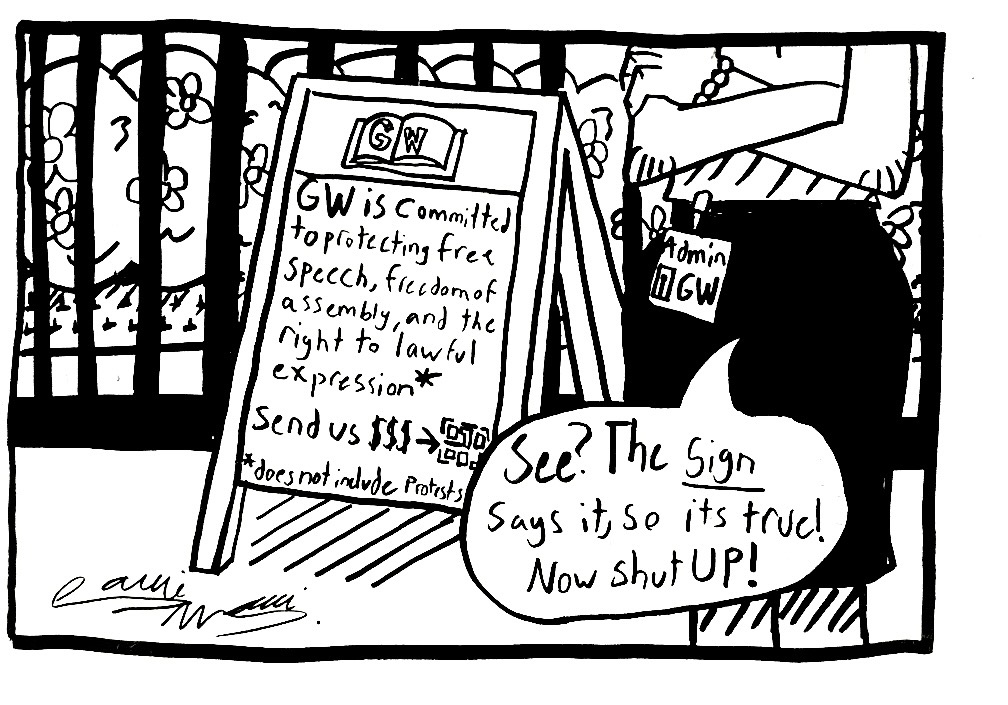While other universities closed their study abroad programs early because of the COVID-19 pandemic, I was left in the dark. I spent weeks wondering first if, then when I would have to leave Chile, and my program was not closed until mid-March.
A number of my friends needed to return home from Europe earlier this month, but students like me in Latin America were not told to leave until mid-March. Deciding whether or not to shutter programs on a case-by-case basis may have been prudent, but it also potentially jeopardized our physical and mental health and the health of our loved ones while they awaited our eventual return to the United States.
The waiting and uncertainty of GW’s response to the virus were difficult to manage while I was abroad. Gauging with what urgency protective measures must be taken in Chile – a country of nearly 20 million people with roughly 150 plus cases of the virus at the time – was harder because the vast majority of Chileans did not show any concern. Most greetings and goodbyes were still conducted with un besito – a kiss, or a handshake, bars and restaurants were still packed and public performances were widely attended. The government imposed a ban on events of 500 or more people and closed the nation’s border starting March 18. Having arrived in late February, I was still acclimating to the culture there and the increased regulations in response to the virus restricted my ability to learn.
It is hard to express my level of disappointment with my abroad experience and the repercussions I fear it may have on my academic future. I was in Chile for a little more than three weeks, and I began classes after two weeks of orientation. Now, courses have transitioned online indefinitely. I cannot be sure that I will be able to complete my academic semester because I have not yet been given guidance on how online courses for my program will proceed. For the remainder of the semester, I will not meet more locals, get any real exposure to Chilean culture or have the opportunity to travel. I cannot achieve any of my goals that I set out to complete when I started studying abroad.
The University shuttering study abroad programs was the right decision in the face of a pandemic as severe as the coronavirus, but I am still disappointed. I lament that I could not stay in Chile with my host family, but I know my biological parents are better equipped to support me should I become ill. Plus, other students abroad do not have adults whose job it is to look after them. GW is right to take extreme precaution. But waiting until the last minute made my time in Chile confusing and stressful.
Getting out of Chile turned into una pesadilla – a nightmare. On March 15, GW recalled all students studying in South America, and my program director informed us we had to leave the country by Friday – the same day students were forced to leave residence halls. I booked a flight for that Thursday. On March 16, the president of Chile announced the country would be closing their borders just two days later. I changed my flight at the last minute and found there were no flights to Austin, Texas – my home, or Dallas or Houston. What should have been a 14 hour trip took 28, and I flew through Colombia and New York before I got home.
The University could not have known the Chilean president was gearing up to shut down the borders – but GW’s delay in canceling abroad programs put students at risk. If officials better monitored the situation abroad, they should have known to be proactive rather than reactive to the heightened safety risks around the globe. At the very least, they should have canceled programs the day the World Health Organization declared the disease a pandemic March 11. Those intervening four days endangered hundreds of GW students and program directors, not to mention their families.
I recognize that a global pandemic is bigger than me and my study abroad, and that I am privileged to have worried about whether or not I would get to visit Patagonia or Easter Island before I had to leave the country. The flip side is, of course, that I worried about my family and friends from thousands of miles away. Many of my family members, including my parents, are of an age where they will likely suffer severe symptoms should they come down with COVID-19. Not only was I helpless to save this opportunity I had been looking forward to since high school, but while I experienced the frustration and angst, I also had to fret about my loved ones.
With the rapid onset of COVID-19 in the United States, I talked to my family every day. My parents asked me daily about the number of cases in Chile, and once courses here shifted online, they asked if I wanted to return home. GW made that choice for me, but I do not begrudge the University its decision – just their timing.
The global situation is upsetting and difficult to manage as the entire world shifts under our feet. Virus totals change daily, and governments have responded with varying degrees of competence. I have to hope things will get better, and that once this crisis is past, the world will be different.
Matthew Zachary, a junior majoring in international affairs, is a columnist.


